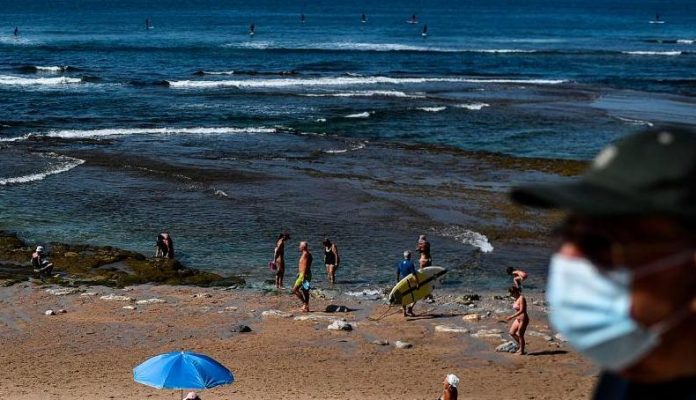Portugal has reportedly been moved from the green list to the amber list sparking chaos for thousands of holidaymakers.
Under the new regulations, anyone returning to the UK from Portugal will have to quarantine for ten days at home.
The decision comes after a meeting between the UK and devolved governments earlier today and advice from the joint biosecurity centre, the BBC reports. The move is expected to be formally announced later.
It is unclear exactly when the new regulations will come into force but reports suggest they could be introduced on Tuesday morning.
This would give some time for Britons currently in Portugal to return but would mean those arriving after 8 June would be forced to self-isolate on their return home.
The Government is also expected to announce the addition of seven new locations to the UK’s ‘red list’ of countries under the strictest restrictions.
These are reported to be: Afghanistan, Bahrain, Costa Rica, Egypt, Sudan, Trinidad and Tobago, and Sri Lanka. When the new rules come into force, all arrivals from these countries will be required to isolate in government quarantine hotels for 14 days.
What does this mean for those who’ve already booked trips?
If the Government formally advises against “all but essential travel” to Portugal, airlines and tour operators are likely to cancel flights and holidays which have already been booked, which should ensure you get a full refund.
However, this isn’t nailed on; some providers are still taking passengers to amber-list countries, which would mean they don’t cancel and won’t refund you. You could be allowed to change the date or time, but this might cost more.
In terms of travel insurance, most firms won’t insure you for a trip to an amber list country due to the Government’s advice not to travel there.
And if you’re already in Portugal? If your flight home is cancelled, Portugal’s EU membership means that travel operators must make sure you get home as soon as possible, and airlines must pay for your accommodation in the meantime. Package holiday providers must also organise a trip home for you, but it might not be as fast.
Portugal had become one of the most popular destinations for Britons due to the option of quarantine-free travel in both directions, but its addition to the amber list will mean the Government advises people not to travel there.
Anyone who does travel to an amber list country must quarantine for 10 days when back in the UK.
Travellers must complete a coronavirus test prior to their arrival in the UK and on day 2 and day 8 of their quarantine. They do not need to isolate in quarantine hotels and can instead do so at home or wherever they are staying.
Countries on the green list are the only destinations from which Britons can return without isolating. Travellers arriving from red list countries must isolate in quarantine hotels for 14 days, at a cost of £1,750 per adult.
Speculation around Portugal’s possible re-categorisation began on Wednesday, when Prime Minister Boris Johnson said the Government would not hesitate to move more countries onto red and amber lists to protect Covid-19 case rates in the UK.
Multiple reports suggest that no new countries are expected to be added to the green list today, dashing hopes for travellers – and foreign tourist industries hoping for a boom of British visitors. This is despite speculation that a number of countries could be bumped up to the green list, reducing restrictions on travellers.
The Caribbean island of Grenada was one destination hoping to see its status downgraded, with its minister for tourism telling the BBC that the decision not to add any countries to the green list was a “huge blow for holidaymakers and the travel and tourism sectors”.
Dr Clarice Modeste Curwen said there have been just 161 Covid cases since the start of the pandemic and no new cases since February, and no important cases since opening its borders to tourists.
Dr Curwen said the destination had introduced “stringent, rigorous and successful programme to control any spread of the virus” and expressed her disappointment that the UK government had not been more lenient







